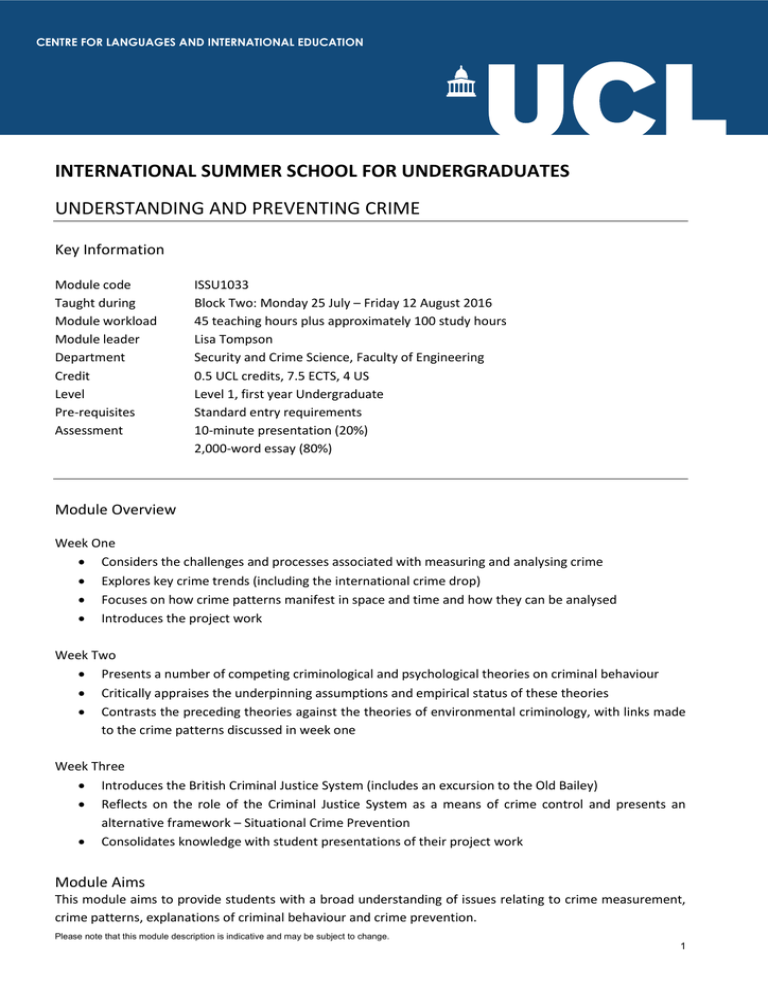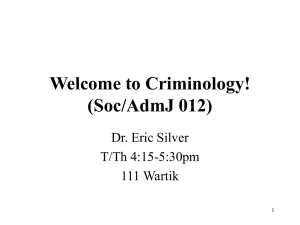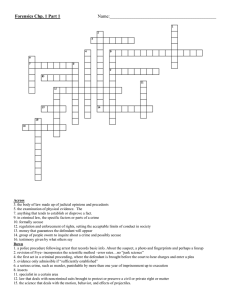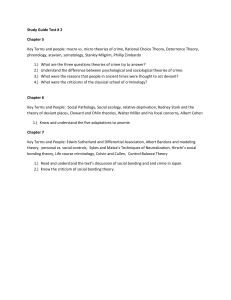INTERNATIONAL SUMMER SCHOOL FOR UNDERGRADUATES UNDERSTANDING AND PREVENTING CRIME Key Information
advertisement

CENTRE FOR LANGUAGES AND INTERNATIONAL EDUCATION INTERNATIONAL SUMMER SCHOOL FOR UNDERGRADUATES UNDERSTANDING AND PREVENTING CRIME Key Information Module code Taught during Module workload Module leader Department Credit Level Pre-requisites Assessment ISSU1033 Block Two: Monday 25 July – Friday 12 August 2016 45 teaching hours plus approximately 100 study hours Lisa Tompson Security and Crime Science, Faculty of Engineering 0.5 UCL credits, 7.5 ECTS, 4 US Level 1, first year Undergraduate Standard entry requirements 10-minute presentation (20%) 2,000-word essay (80%) Module Overview Week One Considers the challenges and processes associated with measuring and analysing crime Explores key crime trends (including the international crime drop) Focuses on how crime patterns manifest in space and time and how they can be analysed Introduces the project work Week Two Presents a number of competing criminological and psychological theories on criminal behaviour Critically appraises the underpinning assumptions and empirical status of these theories Contrasts the preceding theories against the theories of environmental criminology, with links made to the crime patterns discussed in week one Week Three Introduces the British Criminal Justice System (includes an excursion to the Old Bailey) Reflects on the role of the Criminal Justice System as a means of crime control and presents an alternative framework – Situational Crime Prevention Consolidates knowledge with student presentations of their project work Module Aims This module aims to provide students with a broad understanding of issues relating to crime measurement, crime patterns, explanations of criminal behaviour and crime prevention. Please note that this module description is indicative and may be subject to change. 1 Teaching Methods This module will be delivered over three weeks of the summer vacation period. Teaching hours will be Monday-Thursday each week with an assessment and plenary event on the final Friday. On the teaching days lectures will be held between 10am and 12pm with a seminar on the same topic between 2pm and 3pm. Moodle quizzes will be set to check the students have understood the reading set for each topic. An excursion to the Old Bailey will take place on the final week of the course. This will be done to illustrate the principles and practicalities of the criminal justice system highlighted in the previous day’s teaching. On the penultimate day the students will be required to present the results of their group work and feedback will be provided in individual groups. A tutor-led session on the last day will summarise and recap the content covered. Learning Outcomes Upon successful completion of this module, students will: Have a grasp of major crime trends Be able to think critically about current methods of crime measurement and crime-related theory Understand the key theories that relate to criminal behaviour and how these can be used to produce effective crime control policies Be able to demonstrate familiarity with the British Criminal Justice System Appreciate the need for evidence-informed responses to crime and the role of multidisciplinary approaches Assessment Methods 10-minute presentation (20%) 2,000-word essay (80%) Key Texts Haney, C., Banks, W.C. & Zimbardo, P.G. (1973) “A study of prisoners and guards in a simulated prison”. Naval Research Review, 30, 4-17. Maguire, M., Morgan, R. & Reiner, R. (Eds.) (2012). The Oxford Handbook of Criminology (5th Ed.). Oxford: Oxford University Press. (Chapers 10, 13, 14, 17, 26, 27 and 32). Newburn, T. (2013). Criminology (2nd Ed.). Abingdon, UK: Routledge. (Chapters 3, 6, 8, 9, 10, 11, 23, 25, 26, 28, 31, 32) Cullen, F. T. & Wilcox, P. (Eds.) (2013). The Oxford Handbook of Criminological Theory. Oxford: Oxford University Press. (Chapters 4, 5, 7, 27, 28, 29) Wortley, R. (2011). Psychological Criminology. London: Routledge. (Chapter 1) Please note that this module description is indicative and may be subject to change. 2







